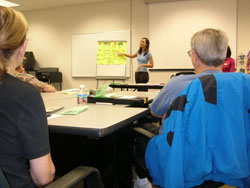TCU Nutrition Students "Focus on Nutrition" for Lockheed Martin Recreation Association
 |
Fort Worth, TX
3/7/2006
TCU senior students in the Coordinated Program in the department of nutritional sciences and Lockheed Martin Recreation Association (LMRA) facilitators have teamed up for a six-week campus-community research project. The students will be serving as interns for LMRA’s “Weigh to Go!” program, which will include interactive “Focus on Nutrition” classes for LMRA members. Classes will cover topics such as food selection, portion control, and stress management. Additional student projects during the spring semester include dietary consultations and analysis, nutrition question and answer sessions for LMRA members, and renovation of the LMRA kitchen for future programs.
Nutritional sciences students are required to conduct research during the Coordinated Program to fulfill partial requirements for a Bachelor of Science degree in nutrition, and campus-community research projects are a popular choice. TCU nutritional sciences professor Dr. Lyn Dart has mentored nutrition students in campus-community research since her arrival in 2001. Dart initializes negotiations for community projects in which both the students and the organization can benefit from the educational interaction.
“We look for sites not only where the students will be learning new skills but also applying what they know to benefit the organization,” said Dart. “Students will be engaged in skills that will be part of their profession.”
Past campus-community research projects with the Birdville ISD, Tarrant Area Food Bank, and Senior Citizen Services have led to long-term partnerships with the TCU Department of Nutritional Sciences, and Dart says this semester’s partnership with LMRA has potential for longevity as well.
Jill Carson, wellness administrator for LMRA, agreed and pointed out one of the key benefits of having the TCU nutritional sciences interns for LMRA. “They help provide professional, credible and reliable nutritional information,” said Carson. Carson went on to mention the overall objective of the TCU interns’ six-week program. “We’re trying to teach the employee how to make mindful choices that will support their long-term goals.”
Nutritional sciences students must apply to the Coordinated Program in February prior to the fall semester, and the application process is highly competitive. Senior nutritional sciences student Kacy Maranto is one of the 11 interns selected for the LMRA program and is also serving as an intern team leader.
Maranto especially stressed the occupational benefits of the LMRA experience for the interns. “It’s a great way to get recommendations, work experience and build your resume,” said Maranto. “It’s also a great way to really find out what you want to do and what you don’t want to do.”
Another TCU intern for the LMRA program, senior nutritional sciences major Kelsey Anderson, has a positive stance on the internship as well. “I've already gained valuable experience, and great friends from this internship,” said Anderson. “I hope that Lockheed continues this relationship we've built with them.”
The TCU/LMRA partnership is the culmination of nearly four months of prior planning and research done by the TCU nutritional science interns, which Dart encourages them to publish. “I usually encourage them to publish pre- and post-data at the state or national level multiple times,” said Dart. “It provides them with professional experience, and community sites like the recognition of being a part of the research.”
In selecting nutritional science interns for campus-community research projects, Dart says the number one criteria is passion. “Do they have a passion to do this and can they do this?” said Dart. For the selected interns, Dart cited the key benefits of campus-community research as performing a service to the community, learning more about their field and participating in research. Dart finished by mentioning the demanding schedule and necessary time management skills required of the nutritional sciences students for a campus-community research internship. “It’s not for everybody,” said Dart, “but for those that can keep up, it’s quite good.”
-30-










